Crude Conversations
”Crude Conversations” features guests who represent a different aspect of Alaska. Follow along as host Cody Liska takes a contemporary look at what it means to be an Alaskan. Support and subscribe at www.patreon.com/crudemagazine and www.buymeacoffee.com/crudemagazine
Episodes
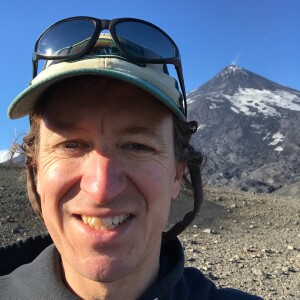
Friday Apr 18, 2025
Chatter Marks EP 108 Monitoring Alaska’s volcanoes with Dr. Matt Haney
Friday Apr 18, 2025
Friday Apr 18, 2025
Dr. Matt Haney is the Scientist-in-Charge at the Alaska Volcano Observatory, where he leads the charge to monitor and communicate the activity of Alaska’s volcanoes — some of the most closely watched in the world. He explains that there are several ways to count Alaska’s volcanoes, but one of the most striking is this: 54 of them have erupted in the last 300 years. That’s more than any other U.S. state. Most of these volcanoes are found along the Aleutian Arc, a seismically active chain that stretches from Mount Spurr — just 80 miles west of Anchorage — through Cook Inlet and out across the Alaska Peninsula and Aleutian Islands. A few outliers, like Mount Edgecumbe in Southeast and Mount Wrangell near Glennallen, add even more complexity to tracking volcanic activity across Alaska.
As a volcanologist, Matt is part of a network that assesses volcanic risk using the National Volcano Early Warning System, which ranks volcanoes by threat level. In Alaska, five volcanoes are classified as “Very High Threat” — including Mount Spurr, Mount Redoubt and Mount Augustine — not just because they’re active, but because they’re near population centers and critical infrastructure. Mount Spurr is currently under close observation due to signs of volcanic unrest, making it one of the most closely watched in the state. When Spurr last erupted in 1992, it launched ash clouds up to 60,000 feet into the sky and shut down Anchorage’s airport for nearly a full day. Ash fall can disrupt air travel, damage engines and electronics, clog air filters, and cause respiratory problems. Today, with Anchorage serving as the second busiest cargo hub in the U.S. — and the fourth busiest in the world — the stakes of an eruption are even higher.
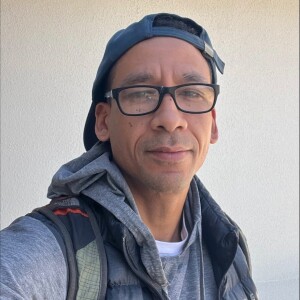
Wednesday Apr 09, 2025
EP 163 Calm, technical and driven with Adrian Williams
Wednesday Apr 09, 2025
Wednesday Apr 09, 2025
In this one, co-host Micah Hollinger and Cody talk to Adrian Williams. Both of them grew up skating the streets of Anchorage, at spots like Hanshew Middle School and Abbott Elementary. Those two spots in particular were important to their upbringing and their skating. It’s where they met up with friends, learned tricks and got shots. They were both on the Boarderline Skate Team too, where the yearly shop video gave them even more of a reason to push the limits of what local skating could look like.
Staying motivated was important to progression, especially in a place like Anchorage, where the weather isn’t always conducive to skating and it’s easy to put limits on yourself. But Adrian was never about that. He was about making the most of his environment, which meant skating tennis-court-skateparks and schools in the summer and cold parking garages in the winter. It was a struggle, but he and his tight-knit group of friends made it work. It’s this perseverance that molded Adrian’s style into what it is — calm, technical and driven. And a lot of his perspective, he learned from his older brother, Angel, who actually got him into skating and remains one of his biggest influences.
His part in Business As Usual, Think Skateboards 2013 video, marked a major turning point for Adrian: Not only did it prove he could hold his own among the best skaters out that year, but it also signaled the beginning of the end for Think, the company he had skated for since 2007. When Think went under, it was a blow to his career. He was now out of a board sponsor and everything that came with it — skate gear, a travel budget, connections to photographers and filmers, and the momentum that comes from being part of a functioning team. It was a jarring reset after years of building toward something bigger. But it never dampened his love for skating. He just had to pivot. So, he picked up more traditional jobs at companies like UPS and Amazon and always made sure that skating stayed a priority. Lately, though, that priority has shifted. In search of more consistent, less physically demanding work, Adrian recently enlisted in the Air Force Reserves, where he’ll be training in Heavy Aircraft Integrated Avionics. It’s a new chapter, for sure, but the same mindset: Still rooted in dedication, persistence and putting in the work. But even with his focus shifting to a new career path, skating will always be a part of who he is.
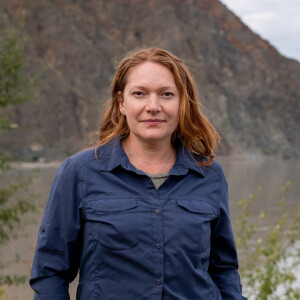
Friday Mar 28, 2025
EP 162 History, power and the Bering Strait with Bathsheba Demuth
Friday Mar 28, 2025
Friday Mar 28, 2025
In this one, Cody talks to author and historian Bathsheba Demuth. She grew up in Iowa, a place she describes as having an extremely cultivated landscape — shaped and managed by people at nearly every turn. Her first exposure to the North came through the writings of Jack London, books her parents read to her aloud. As a kid, London’s tales of adventure resonated with her, but as she got older she began thinking about his reflections on how economic and political systems can crush people. At 18, she made the decision to head to the Arctic. There she spent time mushing dogs in the Yukon. She says that experience was utterly transformative. It shifted her idea of what it means to be a human being — not as a lone agent of individual destiny, but as a life that is part of a broader ecology.
In her book “Floating Coast: An Environmental History of the Bering Strait,” she compares how Soviet Russia and the United States approached the Arctic, specifically around the Bering Strait. What she discovered was that despite their ideological differences, both nations treated animals and sealife in similar ways — primarily as resources to be managed or harvested. For those living outside the Arctic, the region has undergone a series of shifting narratives, it’s gone from a place of extraction, to a geopolitical flashpoint during the Cold War, and now, to the forefront of global climate change. Both of those perspectives stand in stark contrast to how many Indigenous Arctic communities have historically related to the sea and the land, their focus being on reciprocity rather than domination.
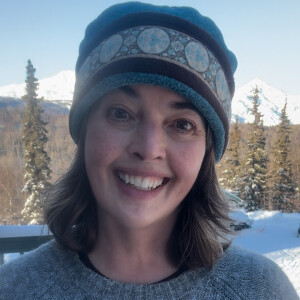
Sunday Mar 16, 2025
EP 161 Finding truth in fiction with Éowyn Ivey
Sunday Mar 16, 2025
Sunday Mar 16, 2025
In this episode, Cody talks to author Éowyn Ivey, whose debut novel, The Snow Child, was a Pulitzer Prize finalist. It captivated readers with its blend of folklore and the Alaska wilderness. Raised in Alaska, Éowyn’s connection to the land is woven into her storytelling, creating atmospheric and emotionally resonant narratives. Before becoming a novelist, though, she worked as a journalist and then as a bookseller. Both shaped her approach to research and storytelling. As a journalist, she says she often felt constrained by the need to report just the facts, realizing that the full story often involved emotions, complexities and more nuanced truths that couldn’t always be captured in a news story. This naturally led her to fiction, where she could immerse readers in themes like isolation, survival and the mystical interplay between humans and nature. Her latest novel, Black Woods, Blue Sky, continues her exploration of myth, survival and the untamed beauty of Alaska.
She says that there’s a power in fiction, an empathy that forms between the book, the reader and the author. As a storyteller, she strives to create feelings and experiences that resonate — moments where a reader might think, “That’s exactly what I felt, but I’ve never been able to put it into words,” or, “I’ve never felt so seen.” This is true for situations she’s personally experienced and ones she hasn’t — that’s where her research comes into play. For Éowyn, writing is about more than just crafting a narrative, it’s about discovering the metaphors and the poetry within the concepts she explores. When she set out to be a novelist, she never imagined it would go beyond the Pacific Northwest. But it has. Her writing is known by people all over the world. But at heart, she still writes for her fellow Alaskans.
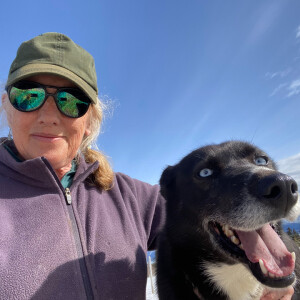
Friday Feb 28, 2025
EP 160 Dogsledding, The Iditarod and making history with Libby Riddles
Friday Feb 28, 2025
Friday Feb 28, 2025
In this one, Cody talks to dog musher Libby Riddles. She was the first woman to win the Iditarod. Back in 1985, she made the decision to push through a storm — a choice that would cement her place in history. While others hunkered down, she bet on her team’s strength and her own resilience, forging ahead into whiteout conditions and brutal winds. It was a bold, calculated risk, and it paid off. But for Libby, just doing the Iditarod was a big deal. She says that as long as she did her best and gave it 100 percent, she really didn’t care where the chips fell. And part of that was breaking the race down — not thinking about the entire 1,000 miles, but just getting to the next checkpoint. Manageable goals. That mindset, along with her deep connection to her dogs, helped her make history.
Her deep relationship with her dogs helped carry her to victory in the 1985 Iditarod, and in the years since, she’s become an advocate for the sport, working to help people understand what dog mushing is really about. These days, it can be tricky for people to grasp— most of us see dogs as companions, not as athletes bred for endurance and work. But those who rely on working dogs, like service animals, tend to understand the dynamic better. And when people see sled dogs in action — on a dogsledding tour or in a race — they get it. They see the excitement, the energy, and the joy these dogs have for running, and they start to understand why mushing isn’t just a sport, it’s a way of life.
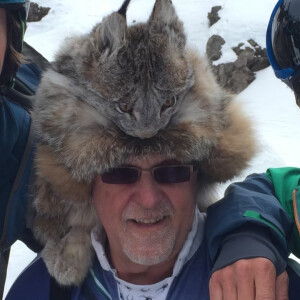
Sunday Feb 16, 2025
EP 159 The Arctic Man with Howard Thies
Sunday Feb 16, 2025
Sunday Feb 16, 2025
In this one, Cody talks to Howard Thies, the founder of Arctic Man, a winter race that combines snowmachines, skiers and snowboarders. It takes place at Summit Lake in Paxson, Alaska and it pairs a snowmachiner and a skier or a snowmachiner and a snowboarder. It’s one of the fastest and most unique races in the world. Skiers and snowboarders start at 5,800 feet and descend to the bottom of a canyon. There they link up with their snowmachine partner, who passes them a tow rope and hauls them uphill for over two miles. Once they’re at the top, skiers and snowboarders separate from their snowmachiner and point it 1,200 feet to the finish line. The fastest competitors have reached speeds of up to 90 miles per hour.
The idea for Arctic Man came from a bar bet between Howard and two other guys. He wagered he could beat them to the bottom of the mountain. So, they all gave the bartender $100 and agreed the winner would take all. Howard won that bet and soon after created what would become Arctic Man. The first one was in 1986. 10 teams competed that year. The next year, there were 25 teams. And then in the 90s, there were 65 teams. It kept growing, becoming more and more popular among racers, families and partiers. For the racers, it was an opportunity for glory and cash; for families and party people, it was spring break. Over the years, it’s become a lot of different things to a lot of different people. And Howard’s been there the whole time organizing and keeping the peace.
He’s 75 now and he’s amazed at what Arctic Man turned into, but he’s unsure of how much longer it will continue. This year, maybe next year. Maybe even the year after that. It’s just so much work and he’s getting older and can’t do everything he once did — setting the course, for example, by putting up fences, flags and gates. Even the idea of passing it on is funny to him. He laughs and says, “First of all, nobody’s that stupid.”
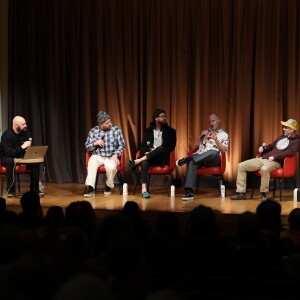
Tuesday Jan 28, 2025
Tuesday Jan 28, 2025
Jason Borgstede is one-half of JB Deuce, a local snowboard and skateboard video that ran from the late-1990s to early-2000s. It was funded by Boarderline Alaska Snow and Skate shop — a retail business host Cody Liska's dad owned — and featured snowboarders and skateboarders from Alaska. Jesse Burtner was the other half of JB Deuce, and together he and Jason filmed their own video parts for it. They also produced all seven videos: Polar Bears, Dog Sleds and Igloos was the first. Then came Northern Exposure, 100%, Survival of the Tightest, The 49th Chamber, In For Life and Steezin’ For No Reason. At first, the video premieres were small — projected onto a screen outside of Boarderline in Dimond Center. But as they grew, so did the venues. Until they were selling out the 4th Avenue Theatre in downtown Anchorage.
To this day, Jason and Jesse have continued to pursue their love of snowboarding and skateboarding. Jason is the owner of Blue & Gold Boardshop in Anchorage and Jesse is the co-founder of Think Thank, a series of snowboard videos with the motto "Progression through creativity."
Skater Micah Hollinger and snowboarder Andre Spinelli also join this conversation. Micah is one of the most celebrated skaters from Alaska. He filmed for all seven JB Deuce videos and went on to bring a unique, creative and artistic vision of progression to skateboarding. Andre, also known as Big Air Dre, filmed for numerous snowboard videos, including JB Deuce and Think Thank. His signature style involves hitting big jumps in the backcountry.
This conversation was recorded in front of a live audience in the Anchorage Museum Auditorium on Friday, January 17, 2025. That event was brought to you by the Northern Boarder’s exhibition. The exhibition celebrates snow and skate culture and community in Alaska through art.
A lot of people helped make this episode possible. Julie Decker, Alex Tait, Danni Crombie and Max Kritzer at the Anchorage Museum. DJ Spencer Lee, and everyone on the panel.
A quick note about the episode: About 42 minutes in, DJ Spencer Lee asks a question, and at the end of the episode there’s an audience Q&A. There, you’ll hear questions from Ollie Burtner, Sharon Liska and Les Burtner.
Photo by Hank Davis
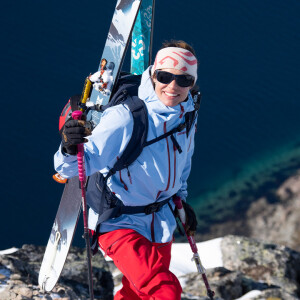
Wednesday Jan 15, 2025
EP 158 Avoiding unnecessary risks with Merrick Johnston
Wednesday Jan 15, 2025
Wednesday Jan 15, 2025
In this one, Cody talks to Merrick Johnston. The best way to describe her is that she’s an athlete. Rock climbing, ice climbing, snowboarding, mountain biking, gymnastics, surfing, whitewater kayaking. You name it, she’s probably at least tried it. But professionally, she’s a skier and a mountaineer. It all started at a young age. She showed interest in the outdoors and her mom was more than happy to oblige because she loved being in the natural world too. So, Merrick learned about the outdoors from her mom. Always pushing her to go bigger, higher and faster. Together, they would do month-long trips skiing across the arctic or teaching cross-country skiing. And then when Merrick was 12, she became the youngest person to summit Denali. Her mom’s teaching style was spartan, sure, but it never overshadowed her love and compassion for her daughter.
For 20 years, she’s been a ski guide in places like Alaska, Wyoming and Norway. When she was 14, she worked as an assistant guide, and her first trip was to the Alaska Range. It was a bit of a disaster. She and another skilled mountaineer were multi-pitching a mountain called Dragon Spire in an area known as Little Switzerland. It was 40 pitches and they were out for 42-hours, causing them to miss their pick-up, which resulted in a search party being sent out for them. That was actually the first time her parents grounded her. She’s learned a lot since then, though. Now, when she guides, she knows that it’s important to make a plan and to stick to it, to never take unnecessary risks, and that it’s important to design a trip so that it accommodates all skill levels.
She’s done a lot of work getting to where she is now. She’s a proud mom and a co-founder of Tromsø Ski Guides in Northern Norway. Along the way, there’s been sexism, divorce and death. But regardless of the drama and the tragedy life can bring, she knows she can always find refuge in the mountains.
Photo by Martin Andersen
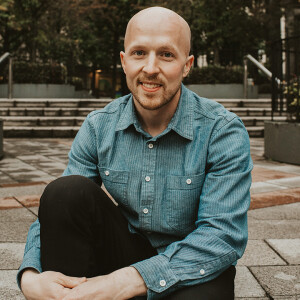
Tuesday Dec 31, 2024
EP 157 Teamwork and compromise in Alaska politics with Jonathan Kreiss-Tomkins
Tuesday Dec 31, 2024
Tuesday Dec 31, 2024
In this one, I talk to Jonathan Kreiss-Tomkins. Ever since he was a kid he’s been interested in politics and sports. Electoral politics and baseball, to be specific. But when it came to politics, he was a prodigy. He could recite groups of politicians — the 50 state attorneys general and all 100 U.S. senators, for example. He was interviewed on NPR at 14, and at 23 he dropped out of Yale, moved back home to Sitka and ran as a Democratic candidate for the state House of Representatives. He would go on to represent Sitka and 21 other rural Southeast Alaska communities in the Alaska House of Representatives, until leaving politics in 2022. His self-proclaimed fanaticism toward sports is what drew him to politics. Like sports, politics is statistical, numeric, and there are winners and there are losers. But with politics, unlike sports, the stakes are higher. They shape the world we live in.
Jonthan credits the Sitka High School Debate Team for giving him the intellectual and ideological versatility that he still relies on today. He says that in debate, it’s common to flip a coin and on the basis of the coin flip you have to argue diametrically opposite sides of the same issue. So, you not only have to understand both sides of an argument, you have to be able to clearly communicate it. In 2014, House Bill 216 was signed into law. It made the twenty Native languages in Alaska official languages of the state. Jonathan sponsored that bill and his efforts were, in part, aided by what he had learned in debate. He says that, like all things in politics, it was accomplished through compromise and teamwork.
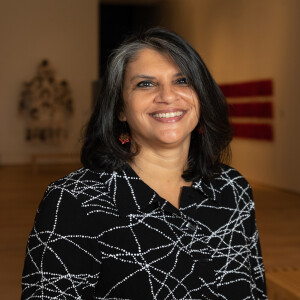
Friday Dec 20, 2024
Chatter Marks EP 100 Conservation and decolonization with Monica Shah
Friday Dec 20, 2024
Friday Dec 20, 2024
Monica Shah is the Deputy Director of Collections and Conservation at the Anchorage Museum. She’s interested in the things that we surround ourselves with, the things that bring us comfort, familiarity and memories. Manifestations of culture and identity. These materials are important to us because they embody our stories. In areas affected by war, for example, we see people rallying behind architecture, art and religious structures. These things are targeted because by destroying them you dehumanize the people they belong to and subjugate them. The opposite is also true, that by creating these materials people are reinforcing their connections with each other and with their community. These concepts — creation, destruction and subjugation — weigh heavily on Monica in the work she does at the Museum.
But why do museums have items from other cultures in their collections? This is an important question that museums around the world have been grappling with. For their part, the Anchorage Museum has put a lot of effort into decolonizing their collections. Sometimes this means working with Alaska Native communities to ensure that cultural materials are displayed accurately. Other times, it means giving them back. In both cases, the goal is to honor the origins of the materials and the culture and lifeways they represent. To understand this from a western point of view, you only have to imagine having something like a family heirloom or a personal keepsake or a diary taken from you without permission and then displayed for all the world to see.





